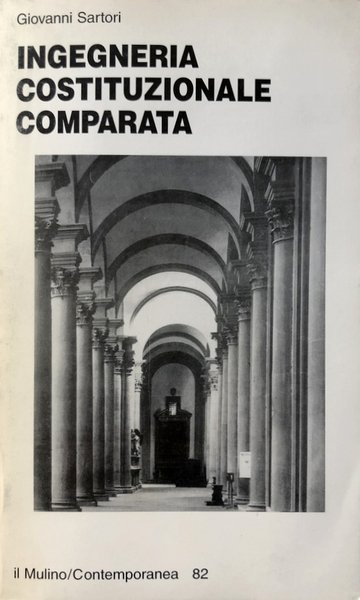
Rare and modern books
Giovanni Sartori
INGEGNERIA COSTITUZIONALE COMPARATA. STRUTTURE, INCENTIVI ED ESITI
IL MULINO, 1995
11.69 €
Studio Maglione Maria Luisa
(Napoli, Italy)
The correct shipping costs are calculated once the shipping address is entered during order creation. One or more delivery methods are available at the Seller's own discretion: Standard, Express, Economy, In-store pick-up.
Bookshop shipping conditions:
For items priced over €300, it is possible to request an instalment plan from Maremagnum. Payment can be made with Carta del Docente, Carta della cultura giovani e del merito, Public Administration.
Delivery time is estimated according to the shipping time of the bookshop and the courier. In case of customs detention, delivery delays may occur. Any customs duties are charged to the recipient.
For more infoPayment methods
- PayPal
- Credit card
- Bank transfer
-
-
Find out how to use
your Carta del Docente -
Find out how to use
your Carta della cultura giovani e del merito
Details
Description
Il volume è diviso in tre parti: "Sistemi elettorali", "Presidenzialismo e parlamentarismo", "Temi e proposte". I sistemi elettorali sono un motore essenziale del sistema politico: plasmano il sistema dei partiti, incidono sul sistema della rappresentanza. L'autore parte quindi dai dispositivi elettorali per metterne in luce effetti e conseguenze. La seconda parte del volume confronta meriti e demeriti dei regimi presidenziali e dei regimi parlamentari, mettendo in luce l'interazione fra forma di governo, sistema elettorale e sistema partitico. La terza parte contiene una proposta dell'autore, volta a superare le strettoie delle forme parlamentari e presidenziali pure, combinando un effettivo controllo parlamentare con un'efficace azione di governo.
Pathbreaking, highly innovative comparative study in state-building by a major political scientist is a fully updated examination of the problems of making democratic government work.
Sartori begins by assessing electoral systems. He attacks the conventional wisdom that their influence cannot be predicted and also disputes the view that proportional representation is always best and will deliver 'consensus democracy'. He argues that the double-ballot formulas deserve more consideration for their ability to facilitate governability in adverse circumstances.
His comparative assessment of presidential and semi-presidential systems and the variety of formulas that are categorized, sometimes misleadingly, as parliamentary, looks at the conditions that allow a political form to perform as intended.
He concludes with a detailed proposal for a new type of government: alternating presidentialism. This meets the need for strong parliamentary control and efficient government, with safeguards against both parliamentary obstructionism and government by decree, and so could help to avoid political paralysis in Latin America, in the post-communist countries of Europe and in countries with dysfunctional parliamentary systems such as Italy and Israel.
Descrizione bibliografica
Titolo: Ingegneria costituzionale comparata. Strutture, incentivi ed esiti
Titolo originale: Comparative Constitutional Engineering: An Inquiry Into Structures, Incentives, and Outcomes
Autore: Giovanni Sartori
Traduzione di: Oreste Massari, Aldo Di Virgilio
Editore: Bologna: Il Mulino, 1995
Lunghezza: 232 pagine; 22 cm
ISBN: 8815051899, 9788815051899, 9788815096364
Collana: Volume 82 di Contemporanea
Soggetti: Scienze politiche, Strutture e processi politici, Scienza Politica, Costituzione, Sistemi elettorali, Forme di governo, Stato, Istituzioni, Funzionamento, Decreti, Leggi elettorali, Sistema maggioritario, Proporzionale, Doppio turno, Rappresentanza, Semi-Presidenzialismo, Parlamentarismo, Vantaggi, Svantaggi, Problemi, Democrazia parlamentare, Camere, Giappone, Germania, Francia, Stati Uniti, Comparazione, Presidente, Federalismo, Riforme, Fuori catalogo, Costituzioni politiche, Teorie, Partiti, Bastardi istituzionali, Classici, Saggi, Costituzionalismo, Consenso, Potere, Bicameralismo, Alleanze, Bibliografia, Political Science, Political Structures, Processes, Political Science, Electoral Systems, Forms of Government, State, Institutions, Functioning, Decrees, Electoral Law, Majority System, Proportional, Double Turn, Representation, Benefits, Disadvantages, Problems, Parliamentary Democracy, Chambers, Japan, Germany, France, United States, Comparison, President, Federalism, Reforms, Out of print, Political Constitutions, Theories, Parties, Institutional Bastards, Classics, Essays, Constitutionalism, Consensus, Power, Bicameralism, Alliances, Bibliography

